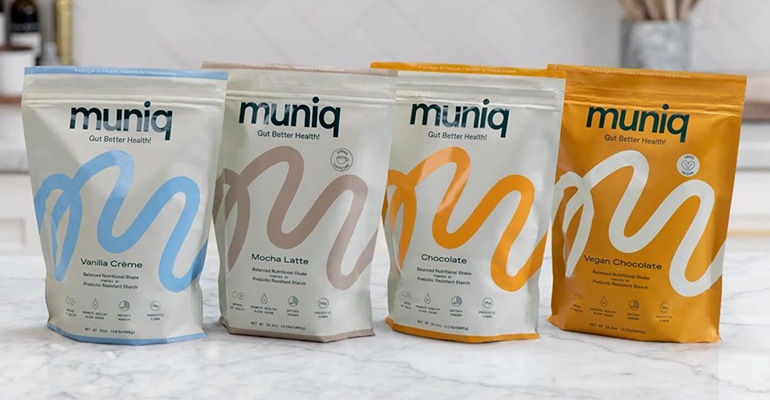Muniq targets a range of health conditions and contains messaging intended to educate consumers on the role prebiotics play with regard to gut health.

Marc Washington spent years in top executive roles within the dietary supplement industry. He held the positions of CEO at Irwin Naturals and president and COO at Beachbody, among others. However, Washington says that his role as the founder of Muniq may have the biggest impact on public health. Read more to learn what he makes of supplement sales trends during the COVID-19 epidemic and how supplementing prebiotic fiber can make a world of difference.
New Hope Network: Demand for supplements is up in the face of this pandemic. What has surprised you about this sales spike?
 Marc Washington: We haven't launched yet [Editor's Note: Muniq launched May 6] so we are not participating in the spike, but I have been obviously staying close to what's happening in the industry on calls and speaking with colleagues, and they’re definitely seeing an uptick.
Marc Washington: We haven't launched yet [Editor's Note: Muniq launched May 6] so we are not participating in the spike, but I have been obviously staying close to what's happening in the industry on calls and speaking with colleagues, and they’re definitely seeing an uptick.
I guess the part that’s a little bit surprising is that it’s not just specific things that are related to coronavirus prevention or just the broader immunity category. You have this halo effect across nutrition and vitamins and mineral supplements that people are looking for to incorporate more healthy solutions into their lives. But there's also a huge spike in comfort foods, highly processed sugary foods. So, you've got these two polarizing things in the nutrition spectrum that are seeing some lift.
Some people are talking about a new normal for heightened supplement consumption. Do you see that happening and, if so, how long do you think it could last?
You know, we need more of that in our lives, better nutrition. Right? And so I definitely am hopeful that some of this will continue. I do not have the viewpoint that the growth that we're seeing is going to maintain at this kind of level. But if I were to get out the crystal ball I would say it will settle somewhere between current sales growth and pre-coronavirus levels. I do think part of this will persist. People are trying to be more proactive and preventative about their health—not just waiting for something really bad to happen.
People are pointing to strong sales growth during the Great Recession as evidence that supplements will fare well during this downturn. Do you think that's a helpful comparison?
Obviously this is a different situation than anything that any of us have ever experienced before. But there is a consistent theme across the different types of disaster scenarios, which is a return to some of the basics. People sacrifice luxury items that are nice to have versus things like nutrition and supplements.
I think what, obviously, is unique in this regard, is this is not just economic or socioeconomic. This is life and death. Relative to other economic downturns and disasters and market crashes, this one feels more directly linked to what you're putting in your body to stay fit and healthy. Unlike some of the past, crashes and disasters, this one is directly tied to public health.
Do you remember a time in your supplement industry career that helped you prepare for COVID-19's effects?
I would say the 2008 crash. I was with the Wonderful Company. We focused on the core issues: How do you respond effectively, how do you innovate and how do you do it in a much more strategic and constrained way? You're doing it in a way that has a higher likelihood of success versus throwing a bunch of things out there.
Obviously, you need to be smart, to be prudent, to always be cautious about investments and expenditures and costs, but then also not go too far with that pendulum. You don't want to go too far cutting back and being pennywise and pound foolish. Businesses that can weather the storm and are smart about investments in innovation can come out soaring.
What is it like to launch during this current crisis?
It is absolutely surreal. On the one hand, life is turned upside down for the industry and for the world. People are dying. We know that people are getting sick or getting crushed economically. Those who are fortunate, like myself and my team, will continue to work and be productive remotely, but we know that not everyone has that luxury.
But at the same time, honestly, I've never been more driven to have impact and to get something into the market than where I am right now. The impact we can have is amplified by the current time. People are dealing with health conditions that are more urgent than they’ve ever been. You look at increased mortality rates and hospitalization for people who had diabetes. You look at the connection between gut health and general health and immunity. There's never been a greater need for the brand we're about to launch. The time is now.
Direct-to-consumer seems like the place to be right now, obviously, but what extra challenges as COVID-19 brought to your strategy?
I think the challenge is going to be more about how to break through all the noise because the noise level is high. Cutting through that in a way that's going to get someone's attention, especially on a brand-new brand that's starting from scratch, that's obviously a big challenge that we're going to be figuring out as we launch the company.
The public’s understanding of prebiotic fiber seems trapped in the bowel health area. What will it take to expand the awareness of other benefits?
That’s actually what attracted me to it. Because when I saw the gap between the science and the consumer awareness, that’s such an opportunity to have an impact. It's not just about the business opportunity. My mom in the middle of Ohio kind of understands what a prebiotic is and understands that this is a real thing.
So a big part of our strategy is awareness and education. We’re giving consumers an understanding of why they need fiber, specifically prebiotic fiber, and of the gut microbiome and what the good and bad bacteria in your gut are and the health conditions they impact.
Immunity is among your product claims. How have you modified that message during the wake of the pandemic?
We're definitely being super careful and cautious about how we talk about immunity. It's actually caused us to go deeper, right into the research and science and that's part of our ethos. We got the data right as opposed to saying "let's make a claim and then find the science." The majority of your immune cells in your body, literally around 80%, are located in your gut. Immune homeostasis is directly tied to your gut homeostasis. And that process happens when you consume prebiotic fibers.
About the Author(s)
You May Also Like




